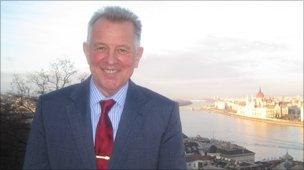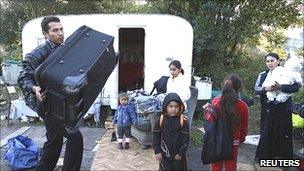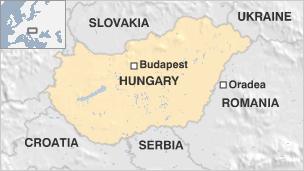Hungary puts Roma high up EU agenda
- Published

President Schmitt backs the centre-right Fidesz government's policies
Hungary is getting an early lesson in Brussels politics as it seeks to calm a storm over its new media law and steady the EU ship for the next six months.
But President Pal Schmitt is a veteran fighter - a former gold medallist fencer in Hungary's Olympic team in 1968 and 1978. The BBC's Nick Thorpe in Budapest asked him about Hungary's approach to the EU presidency.
Pal Schmitt was a loyal player in the centre-right Fidesz team which won last April's elections overwhelmingly and swiftly set about changing Hungary's political landscape.
The Prime Minister, Viktor Orban, calls it a revolution. Critics liken the process to a steamroller, or a bulldozer.
Pal Schmitt was elected president in August, exchanging his velvet chair on the Pest side of the Danube for a leather throne in Buda.
His predecessor, Laszlo Solyom, antagonised the former Socialist government by returning one law after another to parliament for reconsideration. President Schmitt has not returned a single one since August - but he doesn't completely rule it out.
"If a bill is against the constitution, or if it does not serve the public good, or if it is against democracy in general... of course I would refer it back to parliament."
Plans to help Roma
One of the main themes of Hungary's EU presidency is the integration of the Roma (Gypsies).
Following the fury over the French deportations to Romania last summer, Hungary feels a particular responsibility to set a good example.
A framework EU convention on Roma integration is due to be presented by Hungary in May.

France was accused of targeting Roma as an ethnic group during expulsions last year
Can he imagine a future Hungarian president of Roma origin - doing for the Roma what Barack Obama did for African Americans?
He does not seem surprised by the question. "There are extremely talented people among the Roma. Yes, I can imagine that."
Some demographers estimate that by 2050, over half the population of Hungary will be Roma, following current trends. But Mr Schmitt sees that as neither probable, nor as a precondition for a Roma president.
"I don't think that more than 50% of the Hungarian population would be of Roma origin. It is not because I do not want that to happen, or that we discourage that... but rather because I believe that sooner or later Hungarians will also find their way back to the sanctity of the family, and there will be larger families, more children born to Hungarian families as well."
"There are three key areas where we have to act... everywhere where we live with the Roma. Education needs to be provided... also social and family support are absolutely necessary, and work opportunities must be created for them.
"There is is still a very high level of prejudice against the Roma people. And we have to fight that."
Media controversy

Like Mr Orban, the president is defensive but not unbending on Hungary's media law, which has been fiercely attacked by some European governments and media organisations.
"The law is about the protection of various rights... the protection of human dignity, the rights of the youth, restoring public service media. It also takes action against hate speech... my heart was at peace when I signed it."
On Friday, Hungary finally presented the law to the EU Media Commissioner, Neelie Kroes. Commission lawyers will now compare its provisions with the Directive on Audio Visual Services and other EU legislation.
"If they find anything in it that would be against EU law or the directives, or the EU guidelines... I believe that it is only right if the prime minister reconsiders certain measures in the law," said President Schmitt.
The legal examination is likely to take at least several weeks, according to a spokesman for Commissioner Kroes.
The sun breaks through the thick cloud over the Danube for the first time in several weeks. We walk out onto the best balcony in Budapest.
The city stretches away towards the flat plains of central Hungary, and the river flows towards Serbia, swollen by snow and rain - threatening natural but not political disasters.
- Published14 January 2011
- Published19 October 2010
- Published4 January 2011
- Published3 January 2011